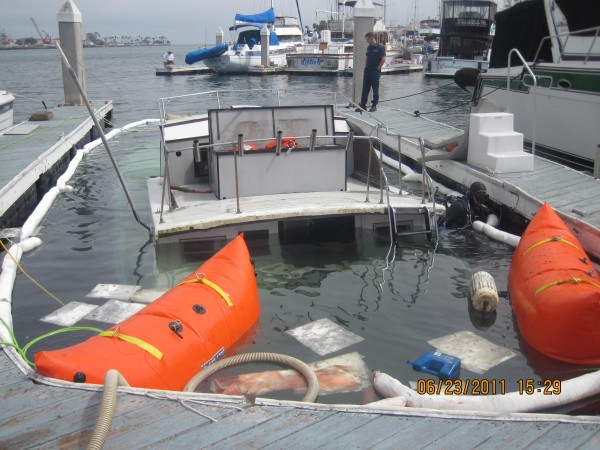TowBoatUS San Diego Raises Another Wooden Boat Headed For The Land Fill

During the sixties private boats started popping up on lakes and waterway making boating an American favorite for relaxing on the water, fishing , or just sightseeing. Most if not all of these boats were made out of Wood. Made from high quality wood and hand craftsmanship they were built to last a life time, or so the builder thought. The late sixties brought a new type of boat Fiberglass. Fiberglass changed the way Americans boated. They could be built lighter and faster than their wood counterparts, but, wooden boats still ruled the roost. By the mid-seventies and early eighties, most of the wooden boat manufactures had either changed to fiberglass built boats or were run out of business altogether. But, the wooden boat still thrived, the splendor of a well maintained wooden boat stood out in front of the quickly overpopulated fiberglass built boat. Although Fiberglass had taken the boating world by storm lots of wood was still used for bulkheads, doors, trim, etc. Builders were still using enough wood make the transition to fiberglass a slow but steady process. The eighties and nineties brought the all fiberglass boat, low maintenance, molded sharp modern lines, planning hulls for speed and fuel efficiency. The wooden boat was quickly becoming a collector’s item. Boat yards started to re tool to accommodate fiberglass repairs and restorations. Most boat yards would still have a wood working shop but would more often sub contract the work out, as the wood working gear took up too much space. Y2K was the beginning of the end for the wooden boat era. Wood rot in the older boats that had gone unchecked became more and more expensive to repair. Often times a wooden boat would go into a boat yard with all intentions to repair some minor wood rot. But, after inspecting further the cancerous rot would be found throughout the boat. With the yard bill becoming unaffordable the boat would be abandoned, leaving the boat yard to flip the bill to dispose of the boat. Today wooden boats are rarely welcome at any boat yard without a large cash deposit to be paid before the boat is even lifted out of the water. The other major factor in the future extinction of wooden boats is insurance. Very few yacht insurance companies will underwrite wooden boats. Most people who have wooden boats in disrepair have few options. Taking a boat to the land fill is expensive; insuring their wooden boat without extensive repairs is becoming impossible.

Marinas require insurance to be able to moor their boat in the marina. Some insurance companies will write Liability only policies that will give the boat owner the ability to keep their boat in a slip but offers very little if nothing as far as coverage. Often times wooden boats will sink in their slip and the owners have liability or no insurance all. This leaves the boat owner responsible for the raising of the vessel, the environmental fees, the emergency haul out and disposal of their boats. Sometime this nightmare is placed on an unsuspecting new boat owner often after they were given the boat or paid very little thinking they were getting a great deal. In the end Wooden boats are in danger of becoming extinct. Even the nice bigger yachts are becoming harder and harder to sell. So, if you have a wooden boat in good shape, keep it up and don’t turn your back on your maintenance program. If you have a wooden boat in disrepair, you may want to look into a solution for either getting back into insurable shape, there are several woodworking shipwrights that do an awesome job of restoring wooden boats. Or, think about selling it, several people are still willing to invest in a wooden boat so long as it is not too far gone. Finally, sending it to the land fill before the unthinkable happens and it sinks, Vessel Assist San Diego has a disposal service for boat owners looking to get rid of their boats. It is not cheap to properly dispose of a boat, but, it is just a fraction of the cost of raising a sunken boat, paying for the environmental fees for the oil and fuel spill, and you still need to dispose of the vessel now more expensive to handle. It is not uncommon for a 40’ wooden boat with twin diesels to cost over $20,000.00 to raise the boat plus the environmental fees plus the disposal.
Vessel Assist has disposed of hundreds of boats before and after they sink on their mooring. Feel free to call us if you have any questions 619-235-8273

